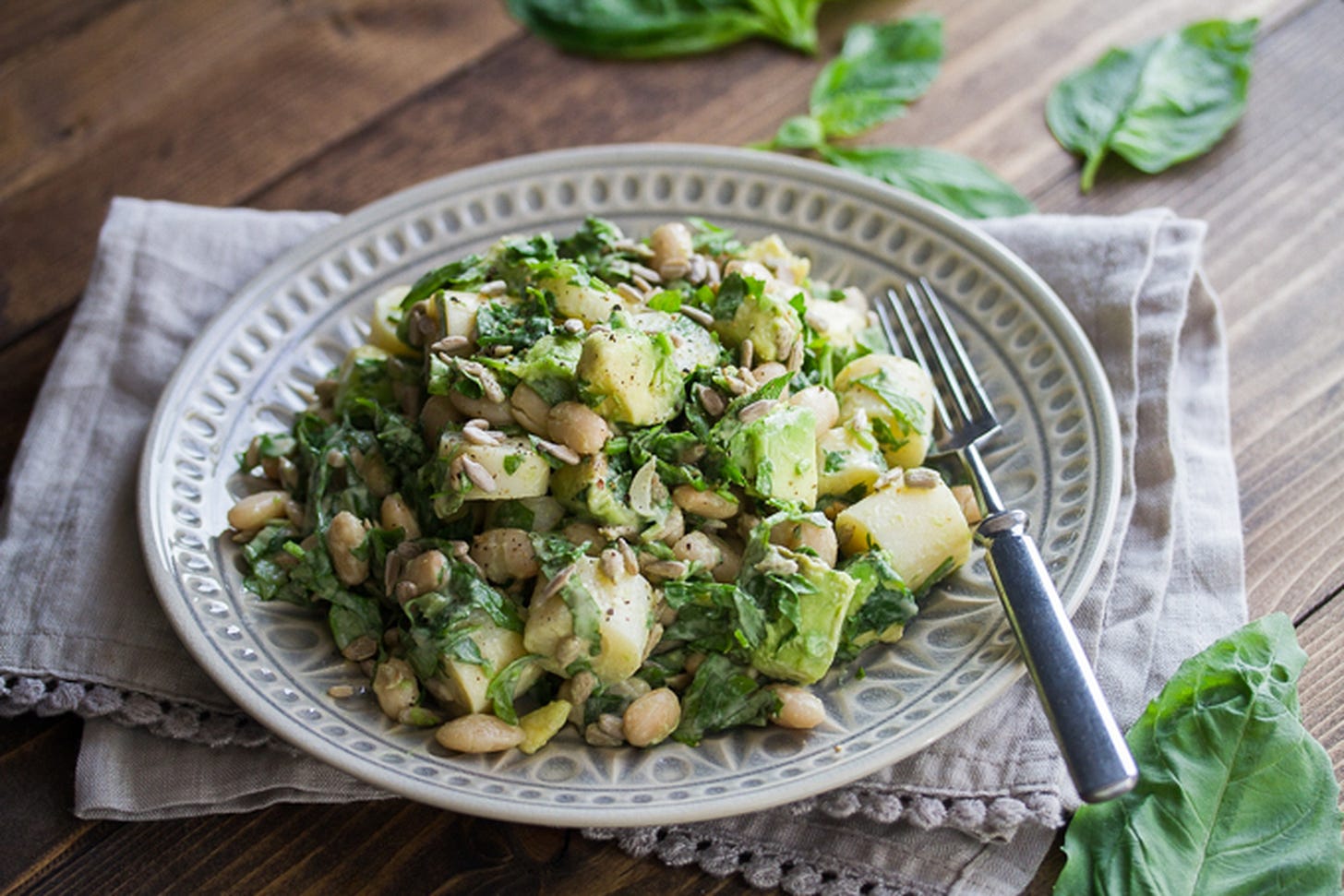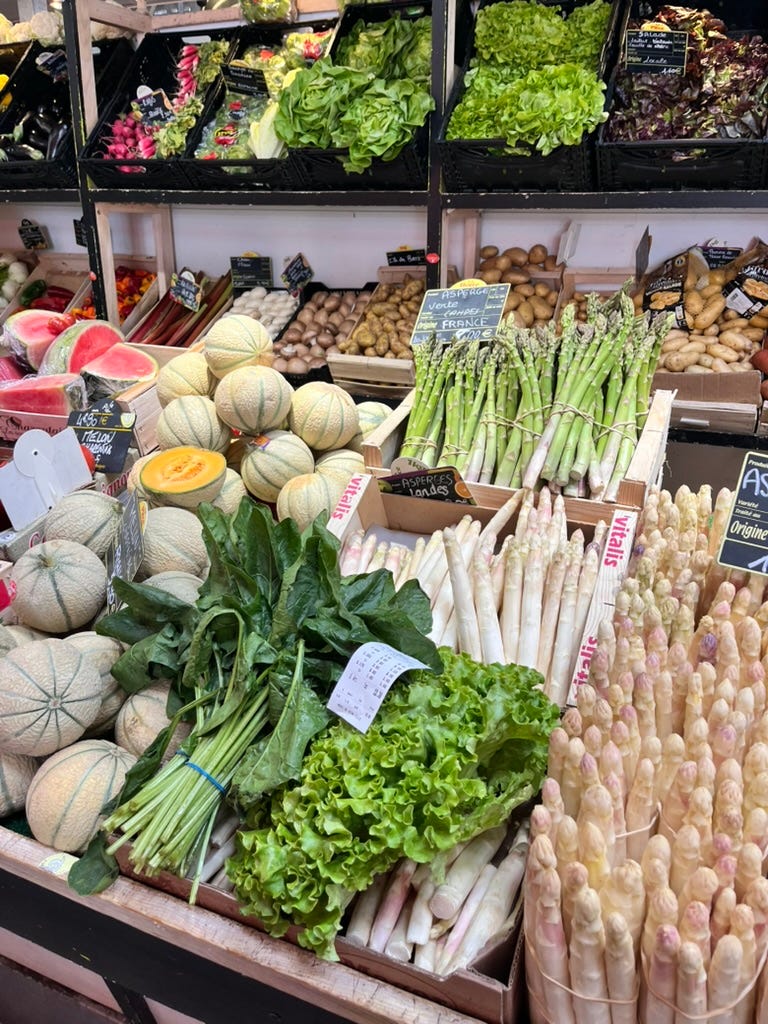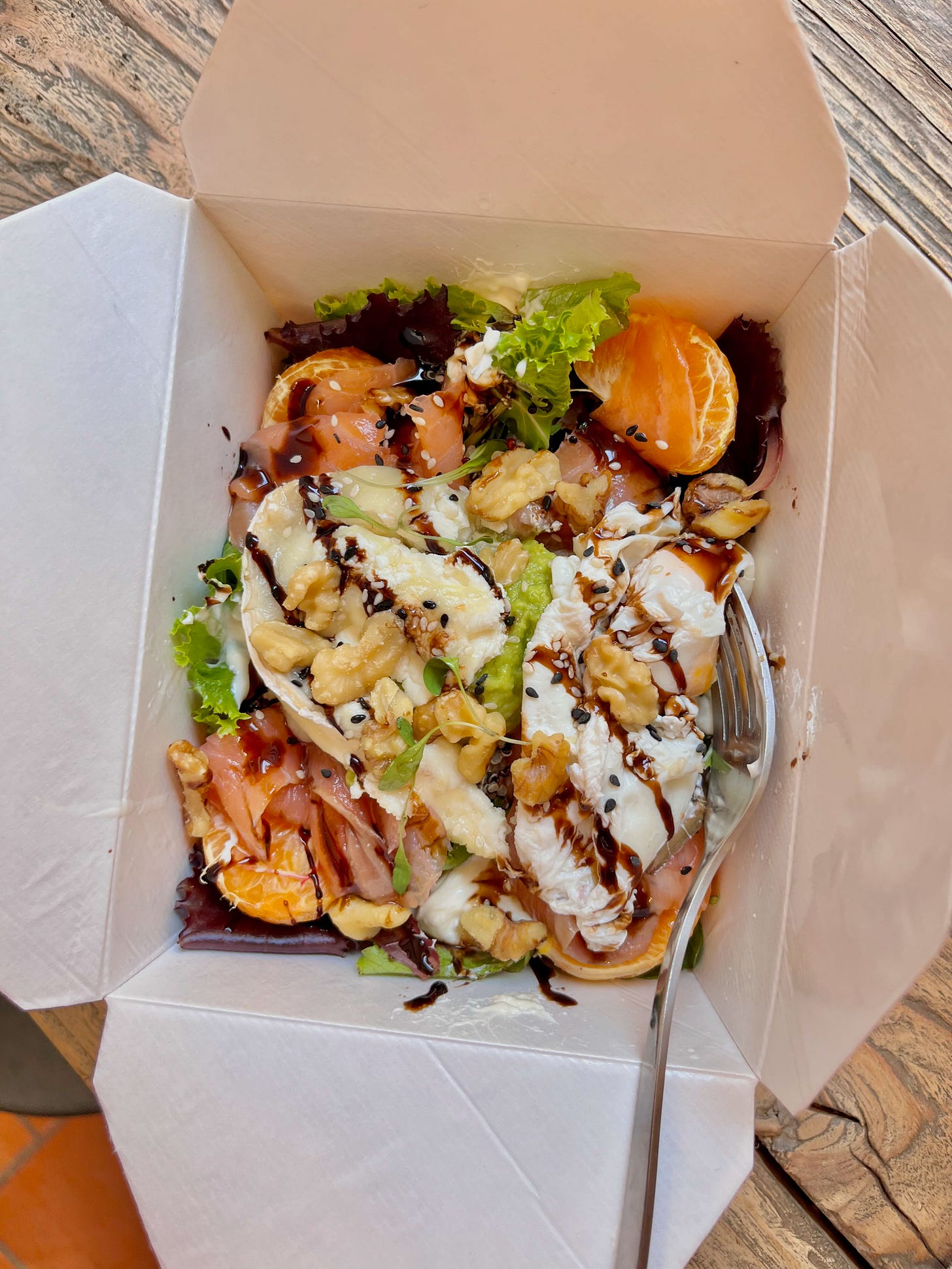French Lessons: The French Art of Aging Beautifully
Recipe: Avocado, White Bean & Fresh Herb Salad
*This newsletter is not intended to be medical advice. Supported by Mandy Murphy Carroll, RD MPH, Dr. Rosa Keller, PHD RD, Dr. Ricki Pollycove OBGYN, & Dr. Claire Packer OBGYN
Welcome to Modern Women’s Nutrition!
Empowering the busy modern woman to understand her hormone & metabolic health, and how to eat to thrive at every step of her journey—from fertility to menopause and beyond.
→ Jump to Recipe: Avocado, White Bean & Fresh Herb Salad
Hey gals!
Last Saturday, I was standing in line at the local farmer’s market (Les Halles) behind a woman in her seventies. She wore a soft linen dress, no visible makeup, and carried a woven basket lined with a cloth napkin. Her hair was silver and swept back loosely, her posture relaxed, her presence… luminous.
I scoped out her goodies—she had leeks, tomatoes, goat cheese, cantaloupe, a baguette, a bunch of tulips. Nothing trendy. Just beautiful food and flowers. And the way she moved, chatting with the vendor, choosing produce thoughtfully, it was like she had nowhere else to be.
I thought about how different her basket looked from the grocery carts I used to see (and fill) in the States. There were no protein powders. No wellness bars. No “skin glow” elixirs or magnesium chews or shelf-stable smoothies in plastic bottles. Just real food. And not a rushed, errand-running vibe, but one of in-the-moment pleasure.
I’ve lived in France long enough now to see this is not the exception. It’s the culture—for all ages. Here, beauty is less about control and more about care. Health isn’t a project, it’s a rhythm. And aging isn’t something to fight, it’s something to nourish.
This post is an homage to what I’ve learned from French women about food, beauty, and the art of living and aging well. And why I’ve let go of the relentless pursuit of wellness in favor of something softer, more sustainable, and infinitely more satisfying.
Beauty and Health Aren’t Optimized—They’re Nourished
When I first moved to France, I noticed a quiet kind of glow among older women. Not the kind that comes from fillers or procedures, but the kind that makes you lean in wonder, how does she do it?
It took me a while to understand: they weren’t trying to look young. They were simply caring for themselves thoughtfully.
Their skin was soft and hydrated. Their gait was relaxed and easy. When spotted in the wild their days seemed to be marked by an easy rhythm, coffee with friends, a stroll through the market, lunch at a well-set table. Their plates were rich in bright veggies and good fats. It looked like health wasn’t something to manage or upgrade. It was just how they lived.
A recent study in Nature Medicine backs this up: women who ate diets centered around fruits, vegetables, and whole grains—without tracking or restricting—had higher odds of what researchers called “healthy longevity” later in life (source).
In my first few months here, I went looking for a paleo or keto granola. No luck. I asked a woman in my strength training class if she knew of any good ones. She smiled and said, “Pourquoi?”
“Why?”
I laughed at the time. But I’ve come to understand just how deeply wise, and radically different, that answer is.
Meals here are made from what’s in season, and what fits the season. Lentils, eggs, cheese, vegetables, yogurt. A pot of soup. A salad of grated carrots. A slice of bread with sardines. And for morning granola, it’s simple and wholesome, and not too much – made with nuts, seeds, buckwheat groats and some oats, with a dash of sugar or honey. There are no macros, no barcodes, and very few supplements. And it works.
Many so-called “wellness” foods—bars, powders, drinks—all over the world are highly processed. Even when they’re low in sugar or “functional,” they’re often stripped of the natural, varied, and synergistic qualities of whole foods—things like fiber, healthy fats, diverse micronutrients, and phytonutrients, things your body actually needs to regulate hunger, blood sugar, hormones, and mood.
Even my friend’s protein-focused food company offers peanut butter as the protein-forward-fuel. Just peanut butter with some salt; no highly refined extracts and supplements with fake sugars mixed in.
Everywhere I look, the French eat with attention. Whether it’s a small plate of radishes with butter, a tartine of bread with a few beautiful toppings, or a heartier chicken dish with potatoes and leeks, there are always real plates and real cutlery, even if simple.
And no screens. No to-go containers. No walking and eating.
Today, I planned to eat lunch in front of the computer, and my friend Clemence was disappointed! She took her lunch up to the rooftop to enjoy the sunshine and take in the view. She’s someone I am learning from.
There’s pleasure in the food and in the pause. Meals feel like small rituals, a chance to reset, reconnect, regulate.
It’s contagious!
I’ve found that I’ve stopped rushing through lunch. I make eye contact with my plate, even if I have to do it in front of the computer here and there. I look up and chew. And I’m full, satisfied, at the end. Not just physically, but emotionally.
This way of eating is about nourishment, but also about self-respect. The kind that seeps into how you digest, how you feel, and how you move through your day.
I didn’t realize how much pressure I carried around food until it was gone. In the States, every meal was a decision tree. Should I eat this? What’s the macro breakdown? Am I being “good” today?
Here, I’m more relaxed. Meals follow the seasons, not a spreadsheet. I don’t track, I taste, and I trust that eating well most of the time is enough. A brookie at a gal’s night? Yes please!
That shift alone has changed my body: less bloating, fewer headaches, deeper sleep, steadier energy. And my wrinkles on my face have decreased, truly! No botox needed. Not because of a specific diet, but because I’m finally not stressed about eating and living.
There’s solid evidence to support this: mindful eating and lower perceived stress are linked to improved digestion, blood sugar control, skin clarity and even immune function (source).
When I arrived, I kept a stash of protein bars in my computer bag. I’d gotten used to thinking of them as essential: for blood sugar, for convenience, for health. But once I started eating like the French: real food, real meals, less snacking, I noticed I didn’t need them.
In fact, I felt better without them. My digestion improved. My cravings faded. I wasn’t constantly grazing. My energy got steadier.
A recent meta-analysis confirms what I experienced. Researchers found that people with the highest intake of ultra processed foods had a 15% higher risk of all-cause mortality compared to those who ate the least—regardless of calorie count or marketing claims (source).
Many protein bars, adaptogen lattes, and functional snacks fall into this category. So while they may look like health, they’re often contributing to the very issues we’re trying to solve.
Aging isn’t something to be “solved” here.
It’s a stage of life to be lived—and the women I’ve met live it well. They eat good fats. They walk. They drink wine. They are always careful not to overeat (the men too), but they don’t apologize for their laugh lines or speak about their bodies with shame. There’s no panic about cortisol or collagen. There’s trust in the body. A reverence, even.
And it shows up in the way they eat. They purchase what’s recommended at the market due to seasonability and quality, not solely just buying greens constantly and eating the same thing everyday.
They meet at a cafe for a cup of loose leaf tea or espresso to sip, not overdoing it. They fold bursting blackberries into rustic tarts and slice apples and radish into their salads. They aren’t picky. They eat what’s fresh. It’s natural. It’s pleasurable.
And it might be powerful, too.
A 2023 study in The American Journal of Clinical Nutrition found that women who regularly consumed flavonoid-rich foods, like berries, apples, teas, and leafy greens, had a significantly lower risk of frailty, along with better physical and mental health in later life. (source)
The very foods these women reach for out of instinct and tradition are the same ones that science now links to longevity.
For Paid Subscribers: 6 Shifts to Nourish Like the French
Keep reading with a 7-day free trial
Subscribe to Modern Women's Nutrition to keep reading this post and get 7 days of free access to the full post archives.












